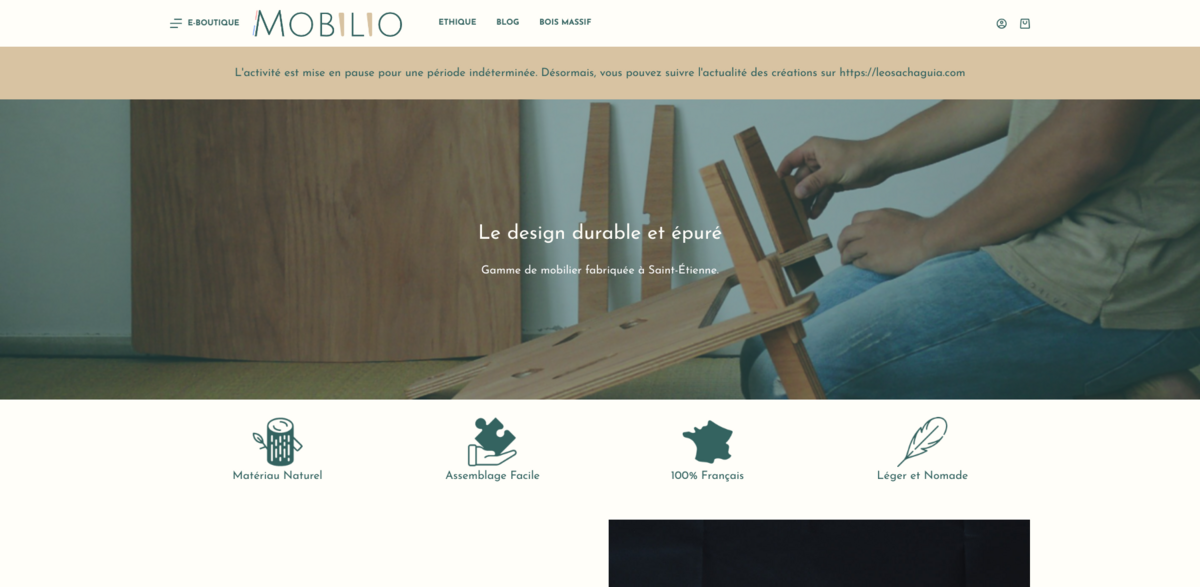What the Project Is
Mobilio is the embodiment of ethical design, a range of kit furniture made in Saint-Étienne that is easy to assemble, durable, and crafted from local wood… Ethics are essential at all levels, as objects dictate our lifestyles. From design and manufacturing to communication, everything is internalized to bring to light the object of values. It is an approach that emphasizes the importance of producing useful and functional creations that not only serve everyday needs but also facilitate the ecological transition. The furniture, which is built to last, stands as a testament to a commitment to sustainability and durability.
Main Benefits and Key Figures
- Ethical production and interiorization of values throughout design, manufacturing, and communication.
- Kit furniture that is easy to assemble and specifically designed for both durability and sustainability.
- Use of natural and more local resources, ensuring that each creation is both responsible and reliable.
- A commitment to accessible design, offering diversified purchasing options that meet varying needs.
- Strong local support from organizations such as the FabLab of Saint-Étienne, the Region, Ademe, and local entrepreneurial training programs.
Embracing an Ethical Approach
Ethics is paramount at every stage of Mobilio’s process. The belief that objects dictate our lifestyles is woven into the fabric of their design philosophy. Design, manufacturing, and even communication are internalized to reflect the true object of values. Each piece is not just furniture—it is a subtle reminder that everyday objects can hold deeper meaning and contribute to society’s ongoing ecological transition. The words of Léo-Sacha Guia, a dedicated designer, resonate in every creation, ensuring that sustainability remains at the forefront.
Durability and Accessibility in Design
Mobilio’s creations are conceived to be reliable, with an unwavering commitment to durability. The objects are designed with the intention to stand the test of time, a nod to a world where planned obsolescence has become all too common. Adding a bit of a personal touch to everyday design, the pieces are produced using natural and local resources that offer reliability with an artisan’s care. Equally important is the approach to accessibility: Mobilio is devoted to making design available to all. By diversifying purchasing options, the project ensures that quality, sustainable design isn’t just a privilege for the few but a standard accessible to a broader community.
Collaborations and Community Support
The journey of Mobilio is marked by strong collaborations and community engagements. The FabLab of Saint-Étienne played an instrumental role during the early prototyping and small-scale production phases. Additionally, support from the Region, which partially financed the website, as well as the backing from Ademe in the approach to sustainable furniture and repair, have all contributed to the robust development of the project. It is also worth noting that Mobilio was born out of initiatives aimed at supporting student-entrepreneurs, with specialized training in entrepreneurship paving the way for innovative startups. This ecosystem, which includes interior architecture specialists like Cityzen.D, further underscores a network of local, environmentally conscious professionals.
Fostering Local Networks and Economic Resilience
A unique aspect of the Mobilio project is its integration into the local network through an innovative local currency. This system allows a territory to value its actors, where no big corporate giants like those from the CAC40 hold sway—instead, the focus remains on artisans, SMEs, and associations. This approach nurtures a self-sufficient economy in which exchanges occur locally, reinforcing community bonds and economic resilience. The currency not only simplifies transactions but also federates a local network of actors, ensuring that every piece of furniture purchased contributes to the local ecosystem. It is a tangible demonstration of trust and interdependence among local professionals.
Project Impact on Sustainable Development Goals
- SDG 9 – Industry, Innovation and Infrastructure: Promoting sustainable industrialization through the creation of locally sourced, durable furniture.
- SDG 11 – Sustainable Cities and Communities: Encouraging environmentally sound design practices and local economic resilience.
- SDG 12 – Responsible Consumption and Production: Supporting sustainable production methods and ethical consumer practices.
- SDG 13 – Climate Action: Facilitating the ecological transition by integrating sustainability into design and manufacturing.
- SDG 17 – Partnerships for the Goals: Building strong local networks and collaborations, reinforcing the connection between communities and sustainable practices.
Future Directions and Local Empowerment
There is something inherently dynamic about a project that aligns creative design with ethics, durability, and accessibility. Mobilio is not just about producing kit furniture; it represents a harmonious blend of design, local responsibility, and community empowerment. Built on values that refuse to compromise on sustainability, every piece of furniture echoes the sentiment that everyday objects can indeed change how lifestyles evolve. The local focus fosters a sense of unity—exchanging among local artisans, SMEs, associations, and professionals creates an environment where nothing goes outwards but circulates and strengthens the area itself. Amid brief pauses and moments of reflection, the project quietly underscores that sustainability isn’t just a trend; it’s a necessity embedded in the objects that shape modern living.


















